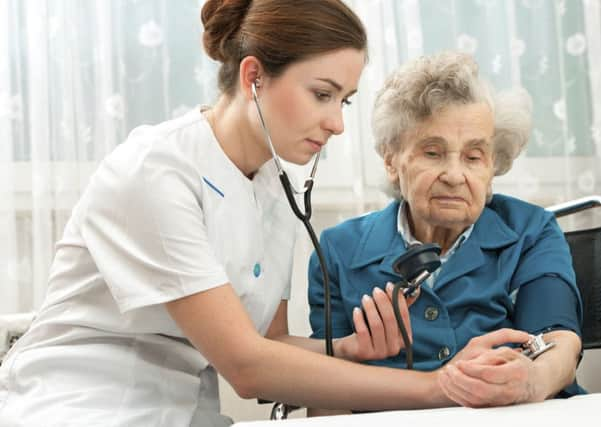David McCullough: Bridging care gap for a happier homecoming


Older members of society are especially vulnerable after a spell in hospital, when their energy and confidence can diminish quickly.
The transition from hospital back to home can be a difficult time, and having the right help in place is crucial in helping older people settle back into daily life and avoiding a rapid return to hospital.
Advertisement
Hide AdAdvertisement
Hide AdIn recent months, the Government has called on families to “step up” and assist their older relatives in times of need such as this, and there certainly seems to be an expectation that families will. But the reality of modern life means that this simply isn’t possible for many.
The Royal Voluntary Service has published its Help Them Home report, which seeks to gain a better understanding of the struggles some families face when an older relative leaves hospital. The charity was assisted by leading health think tank The King’s Fund in its research.
The findings show that although families tend to rally together at the point of crisis and an older person can be visited multiple times while they’re in hospital, one in three does not in fact have a strong family network to fall back on for help when they leave hospital.
There can be many reasons why. On average, those with a parent over the age of 75 now live 77 minutes away — making it difficult to pop by for a cup of tea or pick up a last-minute prescription. Also, many find themselves inflexible due to other life commitments, such as work or young children.
Advertisement
Hide AdAdvertisement
Hide AdOf course there are many families that can and do provide post-hospital care for their older relatives, but the number unable to bridge the gap is significant.
Understanding the personal circumstances of families and their ability to cope is therefore crucial not only for the health of individuals, but the efficiency and outcomes of the health and social care system.
With formal care in shorter supply, it is more important than ever that hospital teams responsible for overseeing the discharge of older patients are able to make a realistic assessment of the strength of an individual’s available support networks for the weeks ahead – not just the next few days.
The report showed that although most families felt staff had developed a good understanding of their relative’s personal circumstances at home, close to a third explained that staff hadn’t actually spoken with them directly about this.
Advertisement
Hide AdAdvertisement
Hide AdWe believe that this assessment is pivotal in making sure the older person has a good recovery and reducing the likelihood of them having to be readmitted to hospital.
And where families are not able to help, there is a clear opportunity for volunteers to step in and provide the support that family or close friends would if they were able.
The services volunteers offer are completely adaptable to meet to needs of the individual. In some cases they may help with chores and go down to the local supermarket, while others simply pop by and have a chat.
The Royal Voluntary Service has seen many genuine friendships born out of its Home From Hospital services – with some extremely heartwarming tales relayed back to the charity.
Advertisement
Hide AdAdvertisement
Hide AdOne example is Wendy, who is 76 years-old. Both her son and daughter live at opposite ends of the country and, after she had a spell in hospital, were too far away to be able to drop in regularly to help out.
At first, Wendy declined volunteer help from the Royal Voluntary Service, but a few days after she was discharged from hospital she realised she wasn’t coping and asked for a home visit.
Previously fit and independent, Wendy felt easily tired and found it difficult to walk any distance, which was a huge knock to her confidence. Over the next six weeks, a volunteer helped her with chores and gradually helped her gain confidence by accompanying her on short trips to the local Co-op and bank.
The Royal Voluntary Service organised food to be delivered, a weekly cleaner and regular appointments with the chiropodist. Wendy has developed a strong relationship with her volunteer and really looks forward to her visits; she’s said she’s going to really miss them when they stop, but is hugely grateful to the charity for helping her feel like her old self.
Advertisement
Hide AdAdvertisement
Hide AdThe Help Them Home report forms part of the Royal Voluntary Service’s on-going Let’s End Going Home Alone campaign, which calls on communities, local authorities and NHS Trusts to work together to provide more volunteers so that support is available for all older people in their homes upon leaving hospital. With the social care system under immense pressure, it really is time for more imaginative solutions.
David McCullough is chief executive of the Royal Voluntary Service.